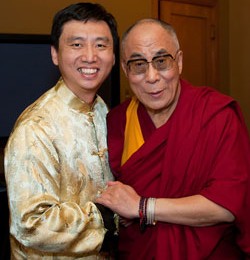The business of mindfulness is discussed nicely in a recent article in The Economist by Schumpeter. The article is being brilliantly discussed by fellow OI1 members on the OI discussion board.
According to the tag line of the article, capitalism is looking for inspiration from Eastern mysticism. For example, Google offers courses “search inside yourself,” “neural self-hacking,” and “managing your energy” as well as a labyrinth for walking meditation. The programs at Google are the perview their “Jolly Good Fellow,” (which nobody can deny :)) Chade-Meng Tan (Meng). I wouldn’t be totally surprised if the labyrinth was inspired by the several visits that Zen Master Thich Nhat Hanh has made to Google. He was just there late last month and offered a day of mindfulness.
Meng is a significant contributor The Center for Compassion and Altruism Research and Education (CCARE) at Stanford University and he partially sponsors the Meng-Wu lectures there.
In addition to Google, Twitter, Facebook, and EBay all have similar programs. Remember, Steve Jobs was a Zen Buddhist and his designs were influenced by Zen.
According to the article, these three things contribute to the rapid growth of the business of mindfulness:
The most obvious is omni-connectivity. The constant pinging of electronic devices is driving many people to the end of their tether. Electronic devices not only overload the senses and invade leisure time. They feed on themselves: the more people tweet the more they are rewarded with followers and retweets. Mindfulness provides a good excuse to unplug and chill out—or “disconnect to connect”, as mindfulness advocates put it. A second reason is the rat race. The single-minded pursuit of material success has produced an epidemic of corporate scandals and a widespread feeling of angst. Mindfulness emphasizes that there is more to success than material prosperity. The third is that selling mindfulness has become a business in its own right. [Read More…].
The author goes on to recount many of the corporations using mindfulness practices and comes to the conclusion that “Western capitalism seems to be doing rather more to change eastern religion than eastern religion is doing to change Western capitalism.”
One of the contributors to the OI discussion board stated,
I like this article. It seems very positive. Anything that leads people to look inward instead of outward is a positive development. Only by turning the focus around and looking inward can the Original Self be revealed. It’s not somewhere out there, which is where we are always looking. (Peter Cutler)
The conclusion reached by Schumpeter is similar to the conclusion that I came to in my most recent book, Cosmology and Buddhist Thought: A Conversation With Neil deGrasse Tyson. I came to the conclusion that Buddhism doesn’t have anything to contribute to science, but science has a lot to contribute to Buddhism.
What do you think about Schumpeter’s conclusion? Is it helpful to introduce meditation practices in business? What do you think?
Three Ways to Order
 |
Paperback version: only $9.95 This paperback version looks really good! |
 |
Kindle version: only $4.74 Works on your iPhone, iPad, iPod, or PC |
 |
Download version: only $2.97 Special offer for the pdf version. |
1OI is the Order of Interbeing founded by Zen Master Thich Nhat Hanh in 1966. OI members commit to studying, practicing, and observing the Fourteen Mindfulness Trainings of the Order of Interbeing. Interbeing is Thich Nhat Hanh’s word for the interconnectedness of all things.














You must be logged in to post a comment.